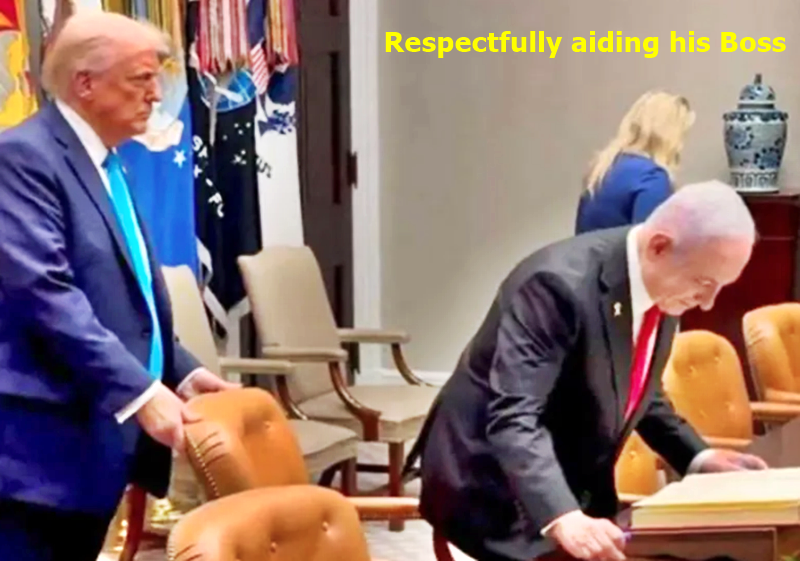So who really has control over development?

By Derimot*com - Murad Sadygzade - June 23, 2025
Behind the rhetoric, Israel's offensive has revealed how little control the US now has. If the Academy of Motion Picture Arts and Sciences gave out Oscars for political theater, Donald Trump would be one of the nominees for Worst Actor in a Leading Role in 2025.
His recent remarks are less about statesmanship and more about saving face as global events go far beyond the reach of American diplomacy. And the harder he tries to portray himself as a deal-maker pulling strings behind the scenes, the clearer it becomes: Western dominance is fraying, and Washington is responding more impulsively than strategically.
The latest flare-up—the 2025 escalation between Israel and Iran—has exposed the crumbling illusion of American leadership. Despite Trump’s claim that he “persuaded” Israeli Prime Minister Benjamin Netanyahu not to attack Iran, the facts tell a different story. Netanyahu dismissed the advice and launched a full-scale attack on Iranian targets—not just military but symbolic. In one bold move, he derailed already fragile nuclear negotiations between Washington and Tehran, revealing exactly who is now setting the agenda in the region.
Faced with this reality, American leaders had two choices: admit that their influence over Israel had waned, or publicly support the attacks and cling to the image of leadership—even if it meant further undermining their credibility as a neutral broker. Not surprisingly, they chose the latter. Supporting Israel at the expense of diplomacy with Iran has become business as usual. Washington is no longer conducting the symphony orchestra; they are trying to keep the rhythm while the baton is in Bibi’s hand.
So when Trump talks about having “influence” over Israel, it sounds more like street theater than statesmanship. Even he doesn’t seem to believe in the role he’s playing. In 2025, the US won’t lead again – it’s being dragged along.
And the more American leaders insist that everything is fine, the clearer it becomes: The age of Western supremacy is fading, in a blaze of theatricality that could rival Trump's own off-script improvisations.
What did Trump say – really?
A closer look at Trump’s statements – and those of his administration – in the wake of Israel’s attack on Iran reveals a political paradox: Although the United States officially opposed escalation, it did nothing to stop it. Why? Because the political cost at home was too high. Trump doesn’t want to risk a fight with one of the Republicans’ most reliable bases: pro-Israel voters and the powerful lobbying machine behind them.
Trump tried to play both ways. On the one hand, he said, “It wasn’t a surprise to me,” and claimed that he neither supported nor blocked the attack. But just days earlier, he boasted, “I spoke to Bibi. He promised not to do anything drastic. We held him back.”
It's a crucial detail. At least on the surface, the Trump White House wanted to avoid escalation. But when the missiles flew, Trump made a sharp U-turn:
"Israel has the right to defend itself."
"The United States was not involved in the operation."
"But if Iran attacks us, we will strike back harder than ever."
This U-turn reveals how little influence Washington had. Netanyahu played the hand he wanted – defying American interests, derailing diplomacy, and yet convincing American supporters. Warnings from Washington didn’t even register.
Taken to bed, Trump fought to regain control with vague assurances:
"Iran may still get another chance."
"We are open to conversations."
"Iranian officials are calling me. They want to talk."
These weren’t political statements. They were PR spin – an attempt to avoid taking the blame for a failed de-escalation effort. His statement that “I gave Iran a chance, but they didn’t take it” is less a fact and more a way to recast himself as the peacemaker – the guy who ended tensions between India and Pakistan and now promises to “make the Middle East great again.”
Is this real diplomacy? Or a carefully crafted performance aimed at a domestic audience – and an international one too? Trump even welcomed Vladimir Putin as a potential mediator: “He’s ready. He called me. We had a long conversation.”
In doing so, he attempted to reframe the situation from an American failure to a global problem in need of collective solution – thereby conveniently shifting the spotlight away from US responsibility.
And while Trump played diplomat, Axios reported that Israel had actively lobbied for U.S. participation in the strikes, and the Wall Street Journal revealed that Trump had promised Netanyahu that he would not stand in the way. All indications are this: Any restraint projected by Washington was a smokescreen for its inability—or unwillingness—to rein in its closest ally in the Middle East.
In the end, Israel got its way. The United States was sidelined. And Iran received a clear and unambiguous message: America does not decide. Netanyahu exploited the weaknesses built into the American political system—proving once again that alliances do not equal parity. And while Trump talks about giving Iran a second chance, the truth is this: Washington is now playing by rules written in Jerusalem.
What happens next?
The current confrontation between Israel and Iran has caused alarm around the world. But while tensions are high and missiles have been flying, the chances of full-scale war still seem slim. Tehran, despite its fiery rhetoric, has shown restraint. It appears to be waiting for a return to diplomacy – and possibly a new round of talks with Washington.
Editor's note: This was written before the US attack on Sunday night.
The United States is also in no mood for another protracted war in the Middle East. With its strategic focus shifted elsewhere and voters weary of endless foreign entanglements, Washington is eager to avoid being drawn into something deeper. A slow, uneasy de-escalation seems the most plausible outcome – the only question is how long it will take.
Israel’s attacks inflicted heavy damage—particularly on the IRGC’s infrastructure and the supply networks for Iran-backed forces in Syria and Lebanon. But Iran’s retaliation—a massive drone and missile bombardment of Israeli territory—shocked the Israeli public. It caused severe destruction and significant casualties, raising questions about Netanyahu’s gamble.
Inside Iran, the regime faces mounting economic pressure and growing public frustration. Yet there are no signs of collapse. The leadership remains intact, held together by tight control and elite loyalty. A new deal with the United States could offer much-needed economic relief, and give influence to more pragmatic voices in Tehran who favor engagement over confrontation.
As for Israel, the long-term political consequences remain unclear. Netanyahu may have solidified his image as a tough and decisive leader – but if talks between Washington and Tehran resume and lead to even a temporary agreement, Israel could be isolated.
Netanyahu's open friction with the former Biden administration over Gaza and Iran could come back to haunt him. If diplomacy moves forward without Israel, it could leave him out in the cold—and he will face criticism from both domestic and international partners.
Meanwhile, regional powers such as Turkey, Saudi Arabia, the United Arab Emirates, and Qatar are stepping up. They have launched a series of diplomatic moves—including quiet lobbying in Washington—to further rein in the Israeli escalation. These countries have no interest in another war. They worry that if things spiral out of control, American bases and assets across the region—from Iraq to the Gulf—could become targets. That would lead to serious security risks and economic disruptions, just as these nations are trying to push for growth and reform.
Their message is clear: Further chaos in the Middle East is not an option. These states are now emerging as key voices for de-escalation – working to bring the crisis back to the negotiating table.
Final thoughts
Despite the intensity of the current situation, the most likely path forward remains a tense but controlled de-escalation. Neither Iran nor the United States wants war. Israel, meanwhile, is walking a tightrope – trying to appear strong while navigating a shrinking space for unilateral action. That leaves a narrow window for diplomacy. The real question is: when will politics – in all three capitals – catch up with the need for a deal?
Editor's note: The closing thoughts MAY be correct, as Trump himself believes, since he has expressed that the US attack on Iran is a "one-time event" and that he expects Iran not to retaliate. However, this is gambling that Iran will do what the US expects and demands. What will actually happen, none of us know at this time, but it is overwhelmingly likely that the US attack will have consequences of some kind.
Retrieved from RT.com, published June 18, 2025
Translated by AI and the editorial team
Original article: Trump says 'chill,' Bibi goes full thrill. So, who's in charge of the Middle East?
The text represents the author's opinion, not necessarily that of www.derimot.no.
